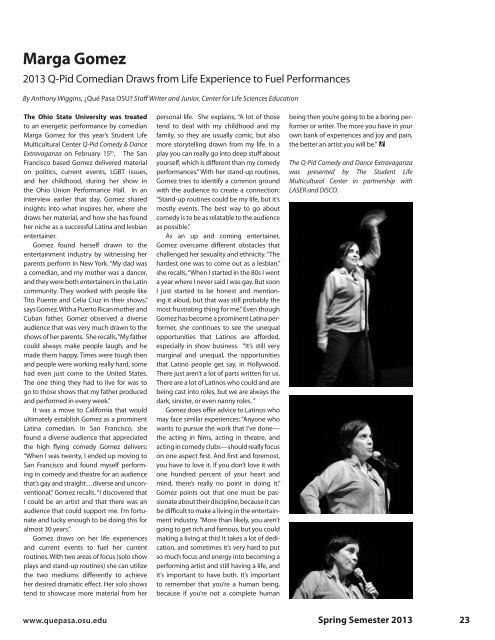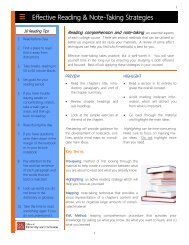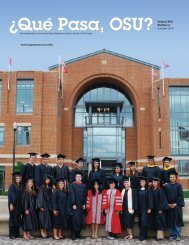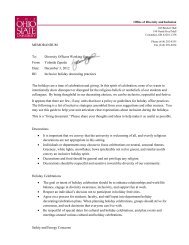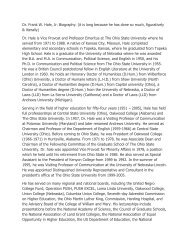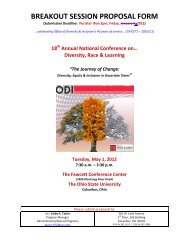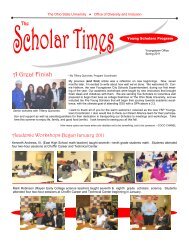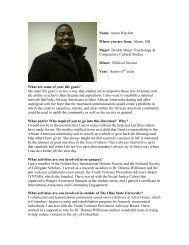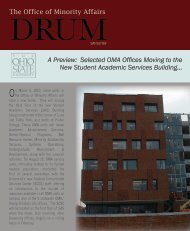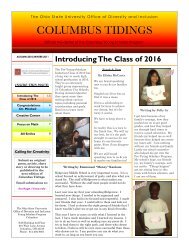Enamored with RadioW<strong>OSU</strong> Internship Fosters a Lifelong LoveBy Leticia Wiggins, PhD Student, Department of His<strong>to</strong>ryRadio can establish a deeply personalconnection even as it reaches out <strong>to</strong> awidespread audience. An understandin<strong>go</strong>f its paradoxical nature drives my loveof radio and is the motivation behind thework I do for “All Sides with Ann Fisher,” atthe NPR affiliated W<strong>OSU</strong>.National Public Radio has always beenin my life, but I first felt a strong connection<strong>to</strong> radio programming on my 12thbirthday. That morning, as I tied myshoes with clumsy bunny loops readyingfor school, my mother phoned a localoldies radio station with a request <strong>to</strong> play“American Pie”—a song I was ridiculouslyand inexplicably enamored with—for “adaughter on her birthday.” The DJ admittedMclean’s opus might be <strong>to</strong>o long <strong>to</strong> add<strong>to</strong> the playlist, but he would see what hecould do. Then, sitting with my legs up onthe school bus seat, I waited, listened, andhoped I would hear the song.Propitiously, the bus driver loved “Oldies102.1” as much as my mother. Sitting in thefront of the bus and halfway <strong>to</strong> school, Ifinally heard a familiar, folksy voice on theradio begin, “A long, long time a<strong>go</strong>….” Asthe entirety of Don Mclean’s American Pieplayed over the radio, I had an epiphany.The song was playing for me, yet othersheard it <strong>to</strong>o. There was a kind of magicthere. That was when I went from appreciatingradio <strong>to</strong> loving it.Years later, as a junior at Ohio State, Iwas excited <strong>to</strong> start an internshipwith W<strong>OSU</strong>. The productionsinternship for “All Sides”at radio W<strong>OSU</strong> covers <strong>to</strong>picsranging from the specifics ofthe Columbus communityand Central Ohio <strong>to</strong> largernational and global issues. Iremember my initial nervousinterview and eventual elationat being accepted for the internposition. As a his<strong>to</strong>ry and comparativestudies major, I hadno journalistic background,but I did have a love for discussionsof public policy, myadopted city of Columbus,and the bearded NPR “Talk ofThe Nation” host Neal Conan.The position involved research for futureshows and correspondence with potentialguests. They needed someone <strong>to</strong> dig uparticles relating <strong>to</strong> daily discussion <strong>to</strong>pics.As I loved both research and working withpeople, I knew this was something I couldtackle. I still remember my first task—looking up the environmental impact ofAsian Carp in the Great Lakes. They aregenerally horrible creatures.Over time, the nature of the internshipchanged. A more developed understandin<strong>go</strong>f the show’s production came with involvingmyself in the phone screening process,podcast editing, and various attempts atscript writing. In addition <strong>to</strong> the developmen<strong>to</strong>f the intern’s tasks, the nature ofthe show was changing. An increase in thenumber of guests and more diverse rangeof <strong>to</strong>pics drove the show <strong>to</strong> focus on “AllSides” of the issues. Representation andconsideration of multiple facets influencedthis talk program’s dialogue; and this ishow the subject of human diversity findsitself at W<strong>OSU</strong>.“All Sides” evidenced its attention <strong>to</strong>diversity when addressing the qualityof programming from the daily newsmeetings <strong>to</strong> the planning of upcomingshows. The underlying question duringthese meetings was “what are peopletalking about?” This attention <strong>to</strong> thegreater community—<strong>to</strong> the issues thatreally matter <strong>to</strong> people—remains at theheart of what “All Sides” tries <strong>to</strong> accomplish.Even so, at times it is necessary <strong>to</strong> considerwhat people are not talking about and look<strong>to</strong> what people should consider.In this vein, “All Sides” works <strong>to</strong> inviteguests <strong>to</strong> the program who range from thenationally acclaimed <strong>to</strong> up-and-cominglocal personalities. During my time at thestation, I have been awestruck over themany encounters with our guests. In thepast three years I’ve had the opportunity <strong>to</strong>speak with Bexley native, Josh Radnor (starof How I Met your Mother), political junkyKen Rudin, Hustler magazine crea<strong>to</strong>r LarryFlynt, and astrophysicist Neil deGrasseTyson. This is just a sampling of thevarious personalities who have gracedthe program. Whether one is a sciencenerd, lover of pop culture, or even an AsianCarp enthusiast, there is undoubtedly an“All Sides” show of interest.This again speaks <strong>to</strong> the show’s ability<strong>to</strong> address a broad audience with diverseinterests. Engaging in <strong>to</strong>pics related <strong>to</strong>science, literature, politics, and transnationalissues endows “All Sides” with avariety of followers who can phone inand participate by lending their variousopinions <strong>to</strong> the program. The show isinherently committed <strong>to</strong> diversity, becauseColumbus is diverse. Additionally, the staffand individuals who work for “All Sides,” andat W<strong>OSU</strong> are wonderful individuals committed<strong>to</strong> educating the broader publicand reporting current issues in an accessiblemanner. Host, Ann Fisher, is genuinelydevoted <strong>to</strong> providing information andtransformative s<strong>to</strong>ries <strong>to</strong> her listenership. Inturn, the producer Michael DeBonis, associateproducer Amy Juravich, and studentproduction assistants Corinne Gleckler,Karam Sheban, and Rose Zhou provide ateam committed <strong>to</strong> providing quality journalismand programming every work-dayfrom 10-Noon. Additionally, all membersof Classical 101, the W<strong>OSU</strong> newsroom,and the many technical geniuses, providea genuinely enjoyable daily work environment.Although I have transitioned froman undergraduate daily intern <strong>to</strong> a oncea-weekgraduate student volunteer, I stillfeel welcomed and am excited <strong>to</strong> be par<strong>to</strong>f W<strong>OSU</strong>.22
Marga Gomez2013 Q-Pid Comedian Draws from Life Experience <strong>to</strong> Fuel PerformancesBy Anthony Wiggins, ¿<strong>Qué</strong> <strong>Pasa</strong> <strong>OSU</strong>? Staff Writer and Junior, Center for Life Sciences EducationThe Ohio State University was treated<strong>to</strong> an energetic performance by comedianMarga Gomez for this year’s Student LifeMulticultural Center Q-Pid Comedy & DanceExtravaganza on February 15 th . The SanFrancisco based Gomez delivered materialon politics, current events, LGBT issues,and her childhood, during her show inthe Ohio Union Performance Hall. In aninterview earlier that day, Gomez sharedinsights in<strong>to</strong> what inspires her, where shedraws her material, and how she has foundher niche as a successful Latina and lesbianentertainer.Gomez found herself drawn <strong>to</strong> theentertainment industry by witnessing herparents perform in New York. “My dad wasa comedian, and my mother was a dancer,and they were both entertainers in the Latincommunity. They worked with people likeTi<strong>to</strong> Puente and Celia Cruz in their shows,”says Gomez. With a Puer<strong>to</strong> Rican mother andCuban father, Gomez observed a diverseaudience that was very much drawn <strong>to</strong> theshows of her parents. She recalls, “My fathercould always make people laugh, and hemade them happy. Times were <strong>to</strong>ugh thenand people were working really hard, somehad even just come <strong>to</strong> the United States.The one thing they had <strong>to</strong> live for was <strong>to</strong><strong>go</strong> <strong>to</strong> those shows that my father producedand performed in every week.”It was a move <strong>to</strong> California that wouldultimately establish Gomez as a prominentLatina comedian. In San Francisco, shefound a diverse audience that appreciatedthe high flying comedy Gomez delivers:“When I was twenty, I ended up moving <strong>to</strong>San Francisco and found myself performingin comedy and theatre for an audiencethat’s gay and straight…diverse and unconventional,”Gomez recalls. “I discovered thatI could be an artist and that there was anaudience that could support me. I’m fortunateand lucky enough <strong>to</strong> be doing this foralmost 30 years.”Gomez draws on her life experiencesand current events <strong>to</strong> fuel her currentroutines. With two areas of focus (solo showplays and stand-up routines) she can utilizethe two mediums differently <strong>to</strong> achieveher desired dramatic effect. Her solo showstend <strong>to</strong> showcase more material from herpersonal life. She explains, “A lot of thosetend <strong>to</strong> deal with my childhood and myfamily, so they are usually comic, but alsomore s<strong>to</strong>rytelling drawn from my life. In aplay you can really <strong>go</strong> in<strong>to</strong> deep stuff aboutyourself, which is different than my comedyperformances.” With her stand-up routines,Gomez tries <strong>to</strong> identify a common groundwith the audience <strong>to</strong> create a connection:“Stand-up routines could be my life, but it’smostly events. The best way <strong>to</strong> <strong>go</strong> aboutcomedy is <strong>to</strong> be as relatable <strong>to</strong> the audienceas possible.”As an up and coming entertainer,Gomez overcame different obstacles thatchallenged her sexuality and ethnicity. “Thehardest one was <strong>to</strong> come out as a lesbian,”she recalls, “When I started in the 80s I wenta year where I never said I was gay. But soonI just started <strong>to</strong> be honest and mentioningit aloud, but that was still probably themost frustrating thing for me.” Even thoughGomez has become a prominent Latina performer,she continues <strong>to</strong> see the unequalopportunities that Latinos are afforded,especially in show business. “It’s still verymarginal and unequal, the opportunitiesthat Latino people get say, in Hollywood.There just aren’t a lot of parts written for us.There are a lot of Latinos who could and arebeing cast in<strong>to</strong> roles, but we are always thedark, sinister, or even nanny roles. ”Gomez does offer advice <strong>to</strong> Latinos whomay face similar experiences: “Anyone whowants <strong>to</strong> pursue the work that I’ve done—the acting in films, acting in theatre, andacting in comedy clubs—should really focuson one aspect first. And first and foremost,you have <strong>to</strong> love it. If you don’t love it withone hundred percent of your heart andmind, there’s really no point in doing it.”Gomez points out that one must be passionateabout their discipline, because it canbe difficult <strong>to</strong> make a living in the entertainmentindustry. “More than likely, you aren’t<strong>go</strong>ing <strong>to</strong> get rich and famous, but you couldmaking a living at this! It takes a lot of dedication,and sometimes it’s very hard <strong>to</strong> putso much focus and energy in<strong>to</strong> becoming aperforming artist and still having a life, andit’s important <strong>to</strong> have both. It’s important<strong>to</strong> remember that you’re a human being,because if you’re not a complete humanbeing then you’re <strong>go</strong>ing <strong>to</strong> be a boring performeror writer. The more you have in yourown bank of experiences and joy and pain,the better an artist you will be.”The Q-Pid Comedy and Dance Extravaganzawas presented by The Student LifeMulticultural Center in partnership withLASER and DISCO.www.quepasa.osu.edu Spring Semester 2013 23


